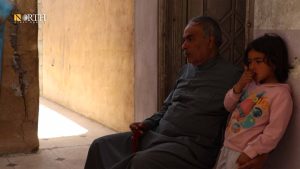Years of Searching: Raqqa Man Still Hopes to Find His Vanished Sister
RAQQA, Syria (North Press) –Ali al-Zahir, 57, lives with the hope of meeting his long-missing sister Sarah again.
The man lost his sister during the last months of the Islamic State’s (ISIS) control over Raqqa, a city in northern Syria. She and her husband disappeared from the city’s Rumaila neighborhood in mid-2017.
Starting in 2014, ISIS took control over vast areas of Iraq and Syria, later announcing the establishment of an Islamic caliphate in both countries with Raqqa as their capital and seat of power.
According to al-Zahir, Sarah’s husband Hussein al-Hammadi sustained a head injury after his house was bombed and transferred to the Raqqa National Hospital.
Al-Zahir told North Press that during his last call with his sister, she told him that she and her injured husband were staying in a house in the Rumaila neighborhood after ISIS emptied the Raqqa National Hospital of civilians.
During that period, al-Zahir and his family were living in Manbij, a city in northern Syria. They had been displaced from Raqqa due to intense battles between ISIS and the Syrian Democratic Forces (SDF), which resulted in the Autonomous Administration of North and East Syria (AANES) taking control of Raqqa.
No Trace of Her
After al-Zahir and his family returned to Raqqa, he started looking for the house his sister had been staying in during their last call.
He eventually found the house, but he couldn’t find his sister and her husband. He inquired with neighborhood residents about the owner of the house, who informed him that the owner had died about a month earlier.
Al-Zahir tracked down the owner’s wife. She told him that after Raqqa was liberated and civilians returned, her husband found the body of an unidentified man and arranged for his burial in the city’s cemetery.
She also told him that her husband had found some medications near the body. The prescriptions bore the name Hussein al-Hammadi, his sister’s husband. However, there was still no trace of Sarah.
Al-Zahir refused to forget his sister. He personally searched for her in mass graves, and he asked some friends who worked in the Raqqa Civil Council’s Initial Response Team – a team that works to locate mass graves left by ISIS and identify the victims within – to immediately tell him if they find any information, description, or papers related to his sister.
ISIS left behind dozens of mass graves in the areas that it controlled. In Raqqa alone, 28 mass graves containing thousands of bodies have been discovered. Most of the victims remain unidentified due to the lack of a PCR-machine to identify people using their DNA, according to Raqqa’s Initial Response Team.
Al-Zahir has not excluded the possibility that Sarah was kidnapped by ISIS members to be used along with other civilians as human shields during their clashes with the SDF.
His missing sister is also a missing mother, and left behind three sons and four daughters. Her oldest son was arrested and forced into conscription by the Syrian government forces in 2015, and is still serving in the military.
Another son and all of her daughters live in a refugee camp in Lebanon’s Beqaa Valley, where they work on farms. The third son works for the Internal Security Forces of North and East Syria (Asayish) in Raqqa.
Al-Zahir, who like many residents of Raqqa living under ISIS rule was forced to witness brutal acts, including beheadings of children charged with “collaborating” with forces opposed to ISIS, now works as a human rights activist.
Despite the years which have passed since Raqqa’s liberation, al-Zahir is still searching for conclusive evidence of Sarah’s fate, out of hope that is sister is still alive but lacking the closure of knowing for sure.
Along with other residents who have returned to the city, he is currently working to establish the ‘Association of Families of the Missing in Raqqa,’ which will search for evidence that helps people find their missing loved ones.

